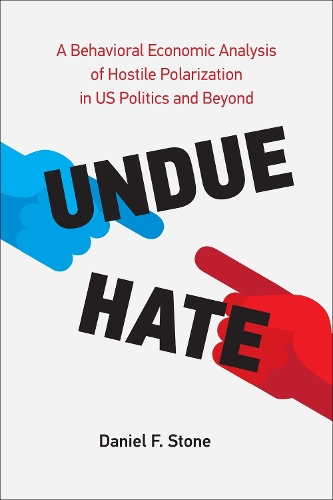
Undue Hate: A Behavioral Economic Analysis of Hostile Polarization in US Politics and Beyond
(Paperback)
Publishing Details
Undue Hate: A Behavioral Economic Analysis of Hostile Polarization in US Politics and Beyond
By (Author) Daniel F. Stone
MIT Press Ltd
MIT Press
6th June 2023
United States
Classifications
General
Non Fiction
Behavioural economics
Social, group or collective psychology
306.0973
Physical Properties
Paperback
200
Width 152mm, Height 229mm
Description
How to understand the mistakes we make about those on the other side of the political spectrum-and how they drive the affective polarization that is tearing us apart. It's well known that the political divide in the United States-particularly between Democrats and Republicans-has grown to alarming levels in recent decades. Affective polarization-emotional polarization, or the hostility between the parties-has reached an unprecedented fever pitch. In Undue Hate, Daniel F. Stone tackles the biases undergirding affective polarization head-on. Stone explains why we often develop objectively false, and overly negative, beliefs about the other side-causing us to dislike them more than we should. Approaching affective polarization through the lens of behavioral economics, Undue Hate is unique in its use of simple mathematical concepts and models to illustrate how we misjudge those we disagree with, for both political and nonpolitical issues. Stone argues that while our biases may vary, just about all of us unwisely exacerbate conflict at times-managing to make ourselves worse off in the long run. Finally, the book offers both short- and long-term solutions for tempering our bias and limiting its negative consequences-and, just maybe, finding a way back to understanding one another before it is too late.
Reviews
[Provides] a carefully qualified account of how a handful of universal cognitive biases play a significant role in exacerbating perceived divisions. . . . Getting rid of the undue hate Stone helps us understand would help us address real problems with factually-supported solutions.
Salon
Author Bio
Daniel F. Stone is Associate Professor of Economics at Bowdoin College. His research is on belief formation, political media, and polarization, and he has taught behavioral economics since 2011. He is also cocreator of the website MediaTrades.org, a participant in Stanford University's "Strengthening Democracy Challenge," and a member of the Braver Angels Scholars Council.
